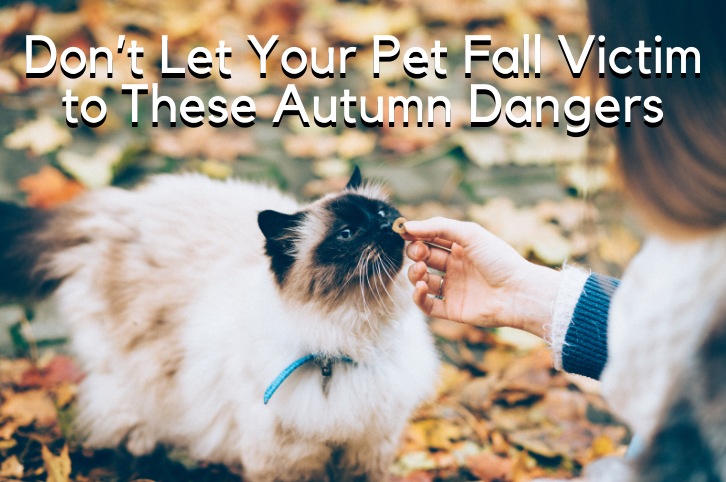Isn’t fall a particularly lovely time to be a pet parent? Daily walks are wondrous as the leaves reveal new colors. Sipping a hot cup of tea while your dog frolics in the yard is delightful. Your cat gets to watch the squirrels scurrying by your window as they prepare for winter.
While all of these activities are enjoyable, some dangers come with the changing weather. When making the most of this beautiful season, keep your companion safe with these pet safety tips.
1. Keep Your Pets Away from Open Fire
Whether you’re toasting marshmallows outdoors or warming up beside an indoor hearth, fire is not pet friendly. You don’t have to miss out on this favorite seasonal activity; just be sure your fall fire isn’t at risk of injuring your pet.
Follow these fire safety tips to keep your animal and human family safe:
- Use a fireplace screen to prevent your pet from getting too close.
- Fully extinguish flames, embers, and coals before abandoning your firepit.
- If you’re inviting your dog to an outdoor fire, keep them leashed the entire time.
- Put out candles before leaving home and keep them out of paw’s reach. (Especially important for cat parents.)
- Place a pet rescue sticker from the ASPCA on your door or front window, so first responders know to find your pet in a worst-case scenario.
2. Beware of Wildlife
When you think of wildlife, what comes to mind? Lynx, bobcats, black bears? (Oh my!) While these large predators obviously pose a threat to your dog or cat, it’s important to protect your pet from all wildlife, big and small.
As winter nears, your local fauna will be preparing for cold weather by building nests or finding a comfy den. Rodents like rats, mice, and squirrels often move closer to human homes as temperatures drop, searching for warmth, food, and protection. They may be little, but claws and teeth can do significant damage to your pet’s eyes, mouth, or nose if a snooping sniffer threatens them.
To protect your pet from wildlife this fall:
- Keep a close eye on your pet while outdoors. Do not let them off-leash to chase wildlife.
- Don’t keep brush piles near your home. These invite rodents by giving them a dark, safe environment to nest in.
- If your dog or cat gets bitten by a wild animal, bring them in immediately. Give us a call on the way and we will be ready.
- Choose pet-friendly methods of rodent control to prevent the accidental poisoning of a curious pet.
3. Don’t Skip Flea and Tick Protection
Your pet isn’t just at risk of a fight with an angry wild animal. Wildlife can carry diseases and parasites, causing major issues for your companion if they are bitten or infested. While it’s an obvious choice during the summer months, flea, tick, and heartworm prevention are imperative all year long.
Did you know that many species of ticks stay active all year? Besides protecting your pet with oral, topical, or wearable preventatives, make your environment inhospitable to ticks. Eliminate areas where they like to lie in wait by removing leaf litter, brush, and tall grass from areas your pet can access. When you return home from an outdoor adventure, check your pet (and yourself) for any hitchhikers, paying particular attention to paws, eyes, and ears.
In addition to ticks, rodents can host fleas and other parasites. You’ve probably heard horror stories about a stubborn flea infestation and the time and money spent to exterminate these unwanted tenants. It’s cheaper and easier to give your pet a preventative before fleas hitch a ride into your house.
4. Keep Your Pet Warm and Comfortable
As temperatures drop, don’t let your companion feel the cold. While our pets have fur coats, freezing temperatures and atmospheric pressure changes can aggravate arthritis and joint pain in pets, particularly in seniors.
To help keep your pet safe and cozy this fall:
- Talk to us about how to alleviate your pet’s joint pain and increase mobility and stability.
- Avoid walking on slippery surfaces.
- Get your senior pet a sweater or coat for extra warmth.
- Add a few extra blankets around the house.
- Relocate your pet’s bed closer to heating vents.
- Invest in an orthopedic pet bed.
- Keep your senior pet active. It’s even more vital as winter arrives to keep your pet’s joints lubricated and muscles healthy.
5. All Pets Need a Little Extra Fall Consideration
Dogs and cats are not the only pets that need seasonal safety considerations. Birds and pocket pets need a little extra care to stay safe too.
Check the location of your feathered friend’s cage to ensure they’re not exposed to direct heat or smoke. If their aviary is near a window or door, you will likely need to relocate it somewhere warmer. Staying close to your bird’s natural habitat’s temperature is a safe choice.
Dry air can lead to brittle feathers, dehydrated skin, breathing issues, and preening problems. If your home becomes too dry, use a humidifier or mist your bird.
For small companion animals like mice, hamsters, and gerbils, provide fresh bedding and plenty of burrowing options. Move your pet’s cage away from the window and keep them active with new exercise equipment.
No matter their type or size, keep an eye on your pet’s food. Store their feed in a sealed container to prevent pesky rodents from finding a free Thanksgiving feast.
Keep Your Pet Feeling Fantastic This Fall
Autumn is a great time to schedule your pet’s checkup. We can guide you through ways to protect your pet and prevent cold-related aches and pains. If it’s been a while since your pet received a veterinary exam, schedule one today. At Homey Gnome, we will go above and beyond to meet all of your pet’s needs.
Image credit: freestocks.org | Pexels


